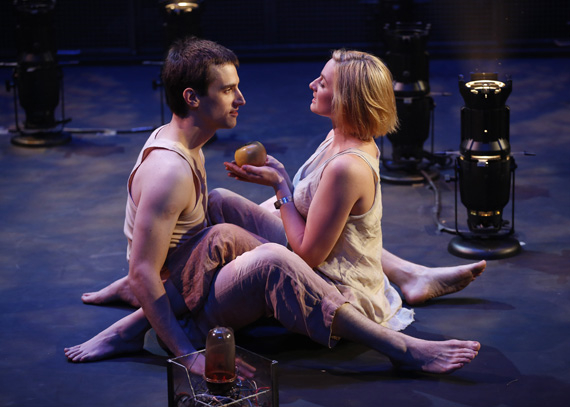Anthem

(© Carol Rosegg)
If you’re in the mood to have your intelligence insulted, hurry on down to the Baryshnikov Arts Center to see the New York premiere of Jeff Britting’s Anthem, based on Ayn Rand’s dystopian novel of the same name. According to Ayn Rand Institute founder Leonard Peikoff in his introduction to the 1995 edition, Anthem was originally conceived as a play, back when Rand was still a teen living in Soviet Russia. Now we can see what that would have looked like: just as reductive and reactionary on the stage as it is on the page, and awfully boring to boot.
For the unfamiliar, Ayn Rand is the author of several novels and essays extolling the philosophy of Objectivism: the belief that “rational self-interest” in a system of laissez-faire capitalism is the highest moral pursuit of humanity. U.S. Senators and business moguls alike count themselves among Rand’s legion of fans. Objectivism is ubiquitous in American society and Anthem is required reading in many American high schools. Producing company Austin Shakespeare might find it in their rational self-interest to tour this production to those high schools. An off-Broadway run for this sub-par fare seems like a mistake.
Anthem is the story of Equality 7-2521 (Matthew Lieff Christian), a street sweeper living in a dystopian future society in which collectivism has completely triumphed over individualism. Poor Equality though, he was born superior to his brothers, both in height and intelligence: “It is not good to be different from your brothers, but it is evil to be superior to them,” he forebodingly tells us. Much of this play is told in direct address to the audience. While a smarty pants like Equality ought to have become a scholar, he was instead relegated to clean up the streets with a broom, punishment for his precociousness.
Unlike the technologically sophisticated societies in Aldous Huxley’s Brave New World and George Orwell’s 1984, Rand’s dystopia has regressed to operate without electricity. One day, Equality discovers a subway tunnel from the “unmentionable times.” His exceptional intellectual curiosity draws him back again and again to investigate the lost knowledge of the time before, and he eventually discovers the secret of electricity. But will the Council of Scholars tolerate such a display of individual ingenuity when the candle market is so lucrative? No, no they will not.
Britting, who is the curator of the Ayn Rand Archives, can rightfully be said to have crafted an incredibly faithful adaptation of Rand’s novel, incorporating long passages of the book into his text. Even characters unique to this stage version, like the elderly Democracy 2-5799 (Tina Johnson), indulge in extended bouts of Rand-speak. Characters and their objectives are secondary to ideas and dialogue serves only as a platform to push the objectivist ideology. This proves excruciatingly dull, making this 90-minute play feel closer to three hours.
The design makes little sense, with a good three quarters of the stage occupied by stage lights that are pointed at the ceiling. This creates a spooky, dystopian aura and provides actors the opportunity to stand above these upturned Lekos and make ghost-story faces. Mostly, though, it just further separates the actors from the audience (much of the action takes place in a narrow platform far upstage) in a theater that should be quite intimate.
On top of the inhibiting design, the acting is generally overwrought, perhaps in compensation for the bloodless text. Even when the play has the potential for dramatic red meat, director Ann Ciccolella squanders it with some laughable bit of stage business. At one point, Democracy 2-5799 talks about the child that was taken away from her by the council. Families are not tolerated in this society (all men are brothers) and procreation takes place in the “Palace of Mating” in which sex partners are randomly paired. As she monologues, Democracy 2-5799 is surrounded by whispering and hissing actors in muslin robes, taunting her like Communist ghouls in an Ayn Rand TV Halloween special.
The collectivist antagonists are so stupid and cartoonish in Anthem that you cannot help but side with Equality. Of course the light bulb is a more efficient way to light cities than candles, you Marxist dolts! It is quite telling, however, that Rand’s philosophy can only make sense in such an extremely two-dimensional world: Reality is much rounder and far more dynamic. Unfortunately, the cult of Rand seems fueled by blind faith and false assumptions, similar to that expressed by Collective 0-0009 (Alex Teicheira) when he says, “What is not done collectively cannot be good.”
The theater is usually a pretty good medium to explore that truth by fairly presenting multiple characters with competing interests and perspectives. As far as plays go, Anthem is just one big straw-man argument with ugly costumes and bad lighting.











